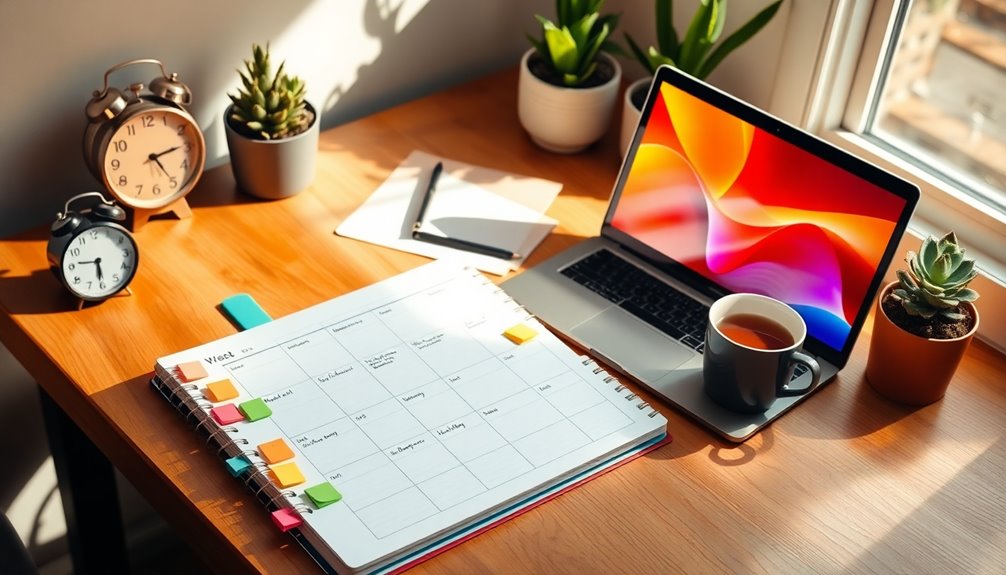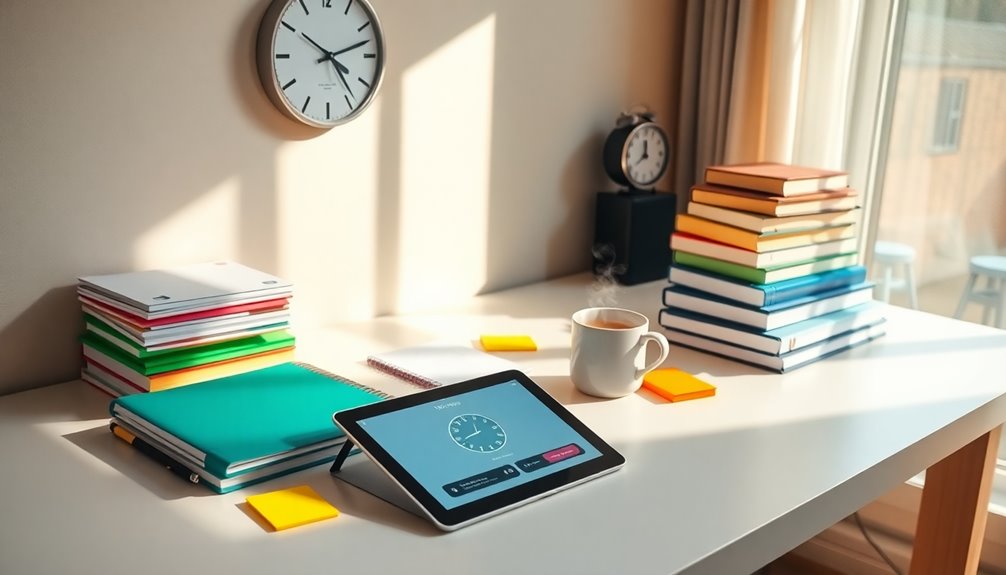Mastering time management involves effective planning, prioritizing your tasks, and minimizing distractions. Start by setting SMART goals and breaking them into smaller, manageable tasks. Use techniques like the Eisenhower Matrix to identify what's urgent and important. Implement time blocking or the Pomodoro Technique to maintain focus and structure your breaks. Keep your workspace organized to reduce interruptions, and consider an accountability partner to fight procrastination. By applying these strategies, you'll boost your productivity and reduce stress. There's plenty more you can explore to enhance your skills and optimize your time management further.
Key Takeaways
- Set SMART goals to create clear, achievable objectives that guide your study sessions and maintain focus.
- Prioritize tasks using the Eisenhower Matrix to differentiate between urgent and important study activities.
- Implement time blocking and the Pomodoro Technique to structure study time and incorporate regular breaks for optimal productivity.
- Minimize distractions by creating a clutter-free workspace and using apps to block distracting websites during study periods.
- Regularly review and adjust your study goals and priorities to stay aligned with your progress and learning needs.
Effective Planning Strategies

Effective planning strategies are essential for mastering time management, especially when you consider how easily distractions can derail your focus.
Start by defining SMART goals—make sure they're Specific, Measurable, Achievable, Relevant, and Time-bound. Break larger goals into smaller, manageable tasks to prevent feeling overwhelmed. Align these goals with your short-term and long-term objectives for better clarity.
Create a to-do list, organizing tasks by priority, and use a planner or digital calendar to allocate specific time blocks for each activity. Don't forget to plan ahead each evening for the next day. Additionally, regularly reassess priorities based on new information to ensure you're focusing on the most impactful tasks. Adopting continuous learning can help you refine your planning strategies and adapt to evolving circumstances.
Be realistic about how long tasks will take, and set reminders to keep yourself on track. This structured approach will boost your motivation and productivity significantly.
Prioritizing Your Tasks

When you prioritize your tasks effectively, you're setting yourself up for success in managing your time.
Start by using methods like the Eisenhower Matrix, where you categorize tasks into urgent and important quadrants. Focus on tasks that are both urgent and important first.
Alternatively, the ABCDE method allows you to label tasks from A (top priority) to E (no priority), helping you determine what to tackle first. Additionally, utilizing audience engagement strategies can enhance your effectiveness in presenting your work.
You could also apply the MoSCoW technique, concentrating on "Must do" tasks before anything else.
Daily, create a prioritized task list, breaking down larger assignments into manageable parts. Additionally, you can enhance your workflow by identifying peak productivity times to schedule high-priority tasks when you're most focused.
Regularly review your tasks to adjust priorities, ensuring that your daily efforts align with your long-term goals.
Minimizing Distractions

To master time management, minimizing distractions is crucial for maintaining focus and productivity. Start by turning off phone notifications and placing your phone on silent mode. Set specific times to check your email instead of constant interruptions throughout the day. Use apps like Strict Workflow or Cold Turkey to block distracting websites and limit social media use. Create a distraction-free environment by organizing your workspace and scheduling focused work periods in your calendar. Additionally, consider implementing on-page SEO techniques to enhance your digital work environment by optimizing your website for better focus. Communicate your focused work times to colleagues to minimize unexpected interruptions. Implement techniques like the Pomodoro Method, using timers to keep track of work sessions. By reducing distractions, you'll enhance your ability to concentrate and make the most of your study or work time.
Managing Breaks Efficiently

How can you make the most of your breaks to enhance productivity? Start by implementing techniques like the Pomodoro Technique, where you work for 25 minutes and then take a 5-minute break. This helps maintain focus and energy. Additionally, listening to classical music during your breaks can further enhance your cognitive function and relaxation.
Don't underestimate micro-breaks; just a minute or two can refresh your mind. Schedule longer breaks, like a lunch hour, away from your workspace to recharge. Research shows that regular breaks significantly enhance cognitive performance.
Assess your routine to identify when you feel fatigued and adjust your break schedule accordingly. Use apps to remind you when to take breaks and track your time.
Overcoming Procrastination

Procrastination can sneak up on anyone, often derailing even the best-laid plans. To combat it, first identify your distractions—be it notifications, social media, or noisy surroundings. Use apps like Freedom to limit digital interruptions and choose quieter study spaces like libraries. Declutter your area to keep your mind clear. It's also important to recognize that small mistakes in time management can compound and lead to greater challenges.
Set specific, measurable goals; instead of "finish reading," aim to "complete 3 chapters." Break large tasks into smaller parts and schedule them using calendars. Breaking tasks into smaller, manageable parts reduces overwhelm and helps maintain focus.
Employ techniques like the Pomodoro Technique to maintain focus, working for 25 minutes followed by a short break.
Lastly, find an accountability partner or join a study group to stay motivated. Celebrate your achievements to keep that momentum going and reduce procrastination.
Boosting Productivity Techniques

While managing your time effectively is crucial for success, adopting specific productivity techniques can make a significant difference in your daily routine.
Start by setting clear, SMART goals that align with your academic and personal priorities. Create a weekly schedule to organize your classes and study sessions.
Consider using the Pomodoro Technique: work for 25 minutes, then take a 5-15 minute break to recharge. Time-blocking is another effective strategy; dedicate specific slots for focused tasks to minimize multitasking. Regular breaks can also help sustain your energy levels and improve focus throughout your study sessions.
Don't forget to plan regular breaks every 90 minutes, as they can boost your productivity by 16%.
Utilizing Time Management Tools

Effective time management tools can transform the way you organize tasks and track progress, allowing you to work smarter, not harder. Tools like Nifty streamline your workflow with integrated time logs and project management features, while Todoist helps you prioritize tasks and manage projects efficiently. Planning the day for just 12 minutes can save 2 hours of work in productivity, reinforcing the importance of effective time management. Additionally, studies show effective time management can boost productivity by up to 25%. Toggl simplifies time tracking with automated timers and detailed reports, making it easier to see where your time goes. Clockify offers intuitive tracking and insightful reporting to improve productivity. For background monitoring, Time Doctor and RescueTime provide automatic tracking and productivity insights, helping you identify distractions.
Maintaining a Balanced Schedule

To maintain a balanced schedule, it's crucial to set clear goals and priorities that guide how you allocate your time. Define your short-term and long-term goals using the SMART criteria to ensure they're specific and achievable.
Prioritize tasks with the Eisenhower Matrix, focusing on what's urgent and important first. Incorporate time blocking to allocate specific periods for tasks, enhancing concentration and minimizing multitasking.
Don't forget to schedule breaks to recharge your focus. Minimize distractions by creating a quiet study environment and using apps to block social media.
Lastly, use techniques like the Pomodoro Technique and "Eat the Frog" to manage work intervals effectively, ensuring productivity while keeping your schedule balanced and manageable. Effective time management can lead to better work-life balance, reducing burnout and enhancing overall well-being and mental health.
Frequently Asked Questions
How Do I Handle Unexpected Interruptions During Study Sessions?
To handle unexpected interruptions during study sessions, first, use the "Let Me Just" phrase to buy yourself a moment to transition.
Allocate specific times for tasks and interruptions to keep control of your schedule. Assess the urgency of each interruption to decide on a response.
Establish clear signals for when you're focused, and consider turning off notifications to minimize distractions.
Finally, create a conducive environment that fosters concentration and calm.
What Are Some Tips for Staying Motivated Over Long Study Periods?
To stay motivated during long study periods, visualize your success and the benefits of mastering the material.
Break your study sessions into manageable chunks and reward yourself after completing each segment. Use positive affirmations to build your confidence and consider joining a study group for accountability.
Regularly check in with a tutor or study partner to keep your momentum going, and always take breaks to refresh and refocus your mind.
How Can I Create a Conducive Study Environment at Home?
To create a conducive study environment at home, choose a quiet, clutter-free space away from distractions like TVs and high-traffic areas.
Organize your materials neatly, using shelves and bins for easy access.
Limit digital distractions by keeping devices out of reach during study sessions.
Ensure your chair and desk are comfortable, and optimize lighting with natural and artificial sources.
Personalize your space with inspiring decor to keep you motivated and focused.
What Role Does Sleep Play in Effective Time Management?
Sleep plays a crucial role in effective time management. When you prioritize sleep, you enhance your focus and concentration, making it easier to tackle tasks efficiently.
Poor sleep can lead to cognitive impairments and increased stress, which complicates your ability to manage time effectively. By ensuring you get adequate rest, you boost your productivity and mental clarity, allowing you to approach your studies with a sharper mind and better organization.
How Do I Adjust My Schedule for Different Academic Workloads?
To adjust your schedule for different academic workloads, start by assessing upcoming deadlines and the intensity of each course.
Break larger tasks into smaller steps, allowing flexibility in your planning. If you find certain weeks busier, allocate more study time during those periods and reduce commitments elsewhere.
Regularly review your calendar, shifting priorities as needed, and use color-coding to visually manage your workload, ensuring you stay organized and on track.
Conclusion
By mastering time management, you can study smarter, not harder. Remember to plan effectively, prioritize your tasks, and minimize distractions to boost your productivity. Don't forget to manage your breaks and overcome procrastination for a balanced approach. Utilize the right tools to keep you organized and maintain a schedule that works for you. With these strategies in place, you'll find that you can achieve your goals more efficiently and enjoy your study time even more!









